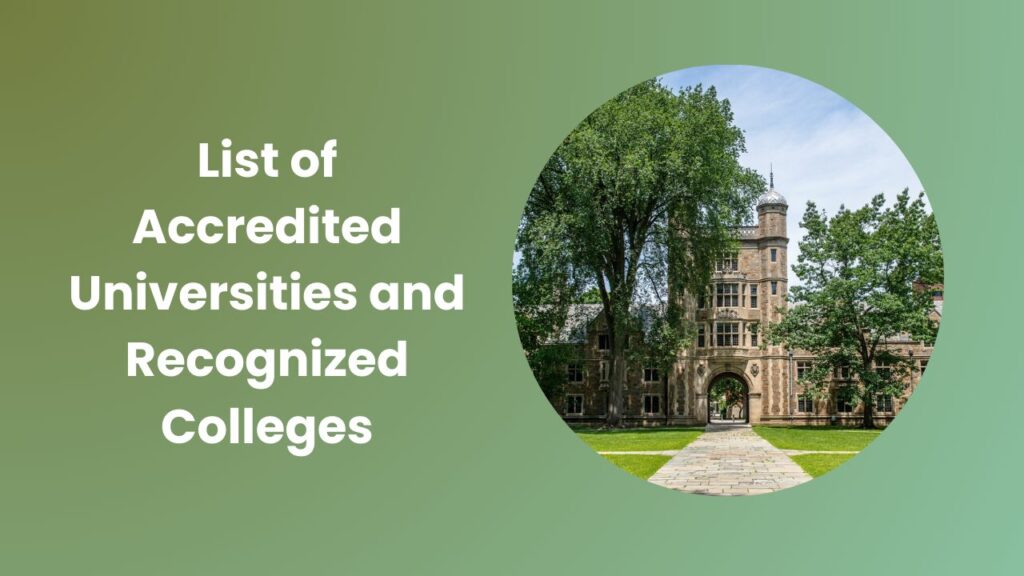When students search for reliable higher education, one of the first things they consider is whether an institution meets recognized quality standards. Accreditation plays a crucial role in this process, as it ensures that a university or college maintains high benchmarks in its programs, faculty qualifications, infrastructure, research opportunities, and overall learning outcomes. In Pakistan, accreditation is overseen by several authoritative bodies, including the Higher Education Commission (HEC), National Business Education Accreditation Council (NBEAC), National Computing Education Accreditation Council (NCEAC), Pakistan Engineering Council (PEC), Pharmacy Council, National Technology Council (NTC), and others. These organizations evaluate institutions rigorously, ensuring that students receive an education that is both credible and professionally valuable. Knowing a university’s place on a list of accredited universities helps prospective students make informed decisions about their academic paths, career prospects, and the quality of the education they will receive.
List of Accredited Universities in Pakistan
Below are several universities in Pakistan that are well recognized for their quality and standards. Each one has been evaluated by relevant accreditation bodies and recognized by HEC. For each, I explain their accreditations, main departments, campuses (if DMA means campuses), and what makes them strong choices.
Abasyn University
Abasyn University is a private institution established in 2007, with its main campus in Peshawar and a branch campus in Islamabad. It is recognized by the Higher Education Commission (HEC), and many of its programs carry special accreditations. For example, its programs in computing such as BS Computer Science and BS Software Engineering have accreditation from the National Computing Education Accreditation Council (NCEAC). Its engineering programs (BE Civil Engineering, BE Electrical Engineering) are accredited by the Pakistan Engineering Council (PEC). Its Pharm-D program is accredited by the Pharmacy Council of Pakistan (PCP). The Islamabad campus (Abasyn University Islamabad Campus, or AUIC) is well-equipped with labs, a digital library, and faculties with advanced qualifications. AUIC offers a broad spectrum of undergraduate and graduate degrees across disciplines such as engineering, health sciences, business, social sciences, technology, rehabilitation and health sciences, life sciences, and computing.
Air University
Air University, established in 2002, is a federally chartered public sector university in Islamabad with multiple campuses including Multan, Kamra, and Karachi. It is recognized by HEC and its programs are accredited by PEC (for engineering), Pakistan Medical Commission (for medical disciplines), and other relevant councils. Air University offers a wide variety of undergraduate, master’s, and PhD programs in fields such as engineering, computing, business, medicine, humanities, and social sciences. The Multan campus is particularly notable for offering BS and MS degrees in management sciences, computer science, mathematics and others, serving students in South Punjab. All its degree offerings meet national accreditation criteria, which makes this university an important entry in any accredited universities in Pakistan.
DHA Suffa University
DHA Suffa University (DSU) located in Karachi is a private, non-profit university offering a range of programs in engineering (electrical, mechanical, civil), computer science, software engineering, and management sciences among others. It holds accreditation from HEC as well as from PEC and NCEAC. The university is known for modern facilities, a residential campus, and strong academic affiliations. Its strong reputation is justified by rigorous program reviews, outcome-based education systems, and linkages with industry. Institutions like DHA Suffa demonstrate how private sector universities can meet high quality benchmarks.
Institute of Business Administration (IBA), Karachi
The Institute of Business Administration, Karachi is among the oldest and most respected business schools in Pakistan. It has been accredited by bodies such as SAQS (South Asian Quality Assurance System) in addition to recognition by HEC. IBA offers undergraduate, graduate, and executive education programs in business, economics, management sciences and leadership. It is often cited in rankings and considered a benchmark in business education
Additional Accredited Institutes List
The following universities are also officially recognized by NCEAC, NBEAC, or other councils. Each is briefly described, and where DMA (degree/major academics / campuses) exist, they are mentioned.
Institute of Management Sciences, Lahore
The Institute of Management Sciences in Lahore is a chartered public university offering programs in management sciences. It is accredited by the National Business Education Accreditation Council (NBEAC), which signifies its adherence to high standards in business education. The institute focuses on developing leadership and managerial skills among its students.
Universities from NCEAC Accredited Institutes List
The National Computing Education Accreditation Council (NCEAC) publishes a list of accredited institutes. Several universities appear there. Among them are Abasyn University (Islamabad, Peshawar), Air University, and many others such as Afro Asian Institute, Lahore; and the computing/computer science departments of many institutions across Punjab, Sindh, KPK, and Islamabad. These institutions’ computing and software engineering departments have met criteria regarding curriculum, faculty, laboratories, and outcomes. Inclusion of their computing programs ensures that degrees will be recognized, students are well-prepared for IT demands, and employers accept their qualifications.
Other Accredited Universities Recognised by HEC
The Higher Education Commission (HEC) maintains a list of recognised universities in Pakistan. This includes both public and private institutions such as Aga Khan University, Air University, Al-Ghazali University, Abasyn University, and many more. Recognition by HEC means the university is chartered, legally permitted to award degrees, and its qualifications are accepted across Pakistan and abroad. While HEC recognition is foundational, program-specific accreditations (e.g., for engineering, computing, business, or medical programs) are also important criteria.
Why Accreditation Matters
Accreditation is a process by which external bodies evaluate universities and their programs to ensure quality, relevance, and accountability. When a university is accredited, its degrees are more likely to be accepted by employers, recognized internationally, eligible for further study, and provide students with better assurance of resources, qualified faculty, proper labs, and a structured curriculum. For example, engineering programs are evaluated by PEC, computing programs by NCEAC, business programs by NBEAC, teacher education by NACTE, agriculture programs by NAEAC, and so on. Without such accreditation, students risk investing in programs that may not be valid or widely recognized.
How to Use Accredited Universities Effectively
First, verify the university’s status on HEC’s recognised universities page. Next, check specific program accreditation from the relevant council (for example PEC, NCEAC, NBEAC) depending on your field. Third, inspect the campus or DMA (Degree-Major Academics or campuses) if relevant: some universities have multiple campuses, and not all campuses or majors may be accredited. Fourth, read about faculty qualifications, research output, student support. Fifth, if you plan to go abroad or want international recognition, check whether the accreditation is up to international standards or recognised beyond Pakistan.
Conclusion
In sum, the list of accredited universities in Pakistan is quite extensive and includes institutions such as Abasyn University, Air University, DHA Suffa University, IBA Karachi, among many others. What distinguishes these universities is not just their official recognition by HEC but the program-level accreditation by bodies like PEC, NCEAC, NBEAC, etc. This ensures that degrees are credible, education is meaningful, and students are better prepared for jobs or further studies. When choosing a university, always cross-check the program’s accreditation status, the campus or major you intend to enroll in, faculty strength, and infrastructure. Making that extra effort will pay off in the long run.
FAQs
What is the difference between HEC recognition and accreditation?
HEC recognition means a university can award degrees. Accreditation is program-specific and ensures the quality of particular degrees like engineering, business, or computing.
How often do universities gain or lose accreditation?
Accreditation is reviewed every few years. Universities can lose it if standards are not met or gain it after improvements.
Does being accredited mean all programs are approved?
Not always. Some programs or campuses may be accredited while others are still under review, so it’s best to verify.
Are degrees from accredited universities accepted abroad?
Yes, mostly. However, acceptance depends on the country and institution, so students should confirm with the destination university.
Can private universities be as good as public ones?
Yes. Many private universities hold strong accreditations and modern facilities, often matching or exceeding public universities.





